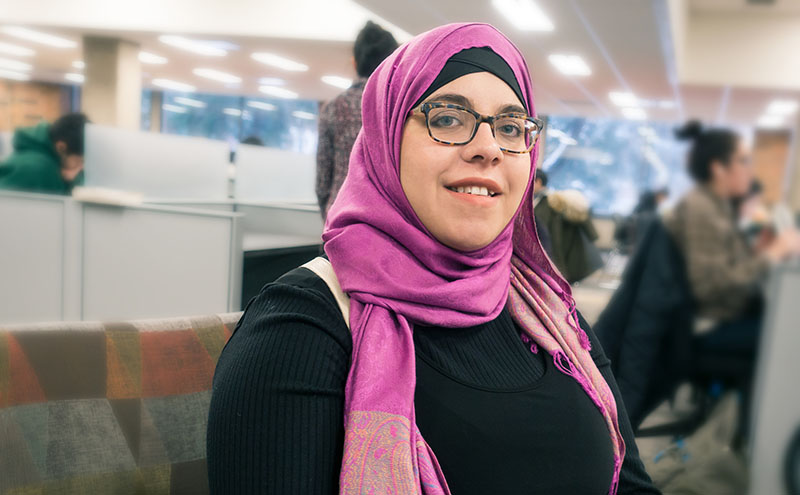
When Nakita Valerio decided to wear the veil, it was for mainly philosophical reasons. As an undergraduate, she admits she was "spiritually lost," reading her way through continental philosophy for answers, especially metaphysics and existentialism.
Though born into a non-practising Catholic family, she'd always had a keen interest in the religions of the world. "Then one day I decided to read the Qur'an, and the Islamic ontologies just kind of resonated with me," said Valerio, who converted to the religion at age 23, the year after she graduated.
Islam offered her the most authentic way of being in the world-one that, to her mind, isn't the least bit out of step with feminist principles. The popular view of the unequal status of women in Islam is a complete misconception, she argues. Wearing the veil is anything but a capitulation to male control.
"I consider myself to be a Muslim feminist, and I consider that term to be redundant. To me, saying you're a Muslim should imply that you're a feminist. People don't understand the history, or that patriarchy and misogyny can infiltrate any cultural system, and Islam is a cultural system.
"It's just changing what we think liberation looks like. We have to get back to scriptural interpretations that are life-affirming, and equality-affirming."
Valerio has just completed a master's degree in history, examining the departure of some 240,000 Jews from Morocco-the vast majority of the country's Jewish population-between 1948 and 1968, partly the result of persecution following the country's independence from France.
What intrigued her most about the emigration was how it is remembered in sometimes contradictory first-person accounts, and explained away by historians, mostly in distorted ways.
"I found there was a denial around some of the violence Jewish people were subjected to among historians," said Valerio. "You can't say the violence or the discrimination didn't exist, and I kind of hoped historians would be more balanced."
According to her co-supervisor, Andrew Gow, Valerio "is the most wide-awake and engaged MA student I have ever taught. Nakita's MA thesis was both scholarly/critical and political/activist in nature."
'Serving others is serving God'
Beyond her academic work, Valerio brings her sense of social justice and strong feminist principles to everything she does. Islam is about recognizing the sacred in all things and in the relationships between them, and that "serving others is serving God."
She helped her Moroccan husband build a school dedicated to educating girls in his home village. It was how she found out about the country's Jewish history there in the first place.
"Growing up, it was really difficult for him and his sisters to get transport to school," she said. "He's the kind of guy who sold his cow, literally, to support the family. Now all the siblings, raised with no electricity, have master's degrees and professional lives."
In Edmonton, Valerio is heavily involved with community service. She is vice-president of external affairs for the Alberta Muslim Public Affairs Council (AMPAC) and a director with the Edmonton Heritage Council, and also works with the Chester Ronning Centre at the University of Alberta's Augustana Campus.
After the Paris attacks of 2015, she introduced through AMPAC a class for Muslim women-based on a program called Strong Orange Violence Prevention-to learn how to stay safe when confronted by potentially violent Islamophobia on the subway or street. And though physical defence is part of the instruction, the class is mainly focused on avoiding violence, and de-escalating it when the threat develops.
"We talk a lot about room scanning-always being aware of what's around you to avoid a threatening situation, and trusting your intuition.
"It's how to find your assertive voice, and recognize that the prerogative is for you to be safe and secure and not have to be an ambassador for Islam." Staying to defend the religion instead of fleeing "gets our sisters into a lot of trouble that way," she said. "They don't want people to think poorly of Islam, but really, you need to get home safe."
Valerio says she has also been reading the report of the Truth and Reconciliation Commission with other Muslim women to find ways for her community to respond to Indigenous calls for equality.
"We're going to be taking the calls seriously and doing what we can. A big thing is becoming ambassadors, allies within our own communities, so that the onus is not just on Indigenous people to educate people about reconciliation and Indigenous history."
Next step: on to the doctorate
Add to all of that the fact she runs her own web content management company and is expecting her second child in January, and it's clear there won't be any downtime for awhile.
But is she at least basking in the relief of finishing her master's degree?
Emphatically no, she said. In fact, she's suffering serious academic withdrawal and can't wait to start her doctorate, perhaps turning her master's research into a graphic novel.
"I'm a weirdo," she said. "All the way through writing my thesis, I actually cried every day because it was going to be over. I even cried at the library when they gave me my alumni card.
"I just love research-I love seeking knowledge, and I'm always banging my fist on the table about the arts. When I was doing my MA, so many people asked me, 'What are you going to do with that? What kind of job can you have?' And I say, 'Do you know how multifaceted my skill set is?'
"Critical analysis is really what our world is missing. It's so crucial for us to be studying ourselves, and a lack thereof is a lot of the reason we have the world we do right now."